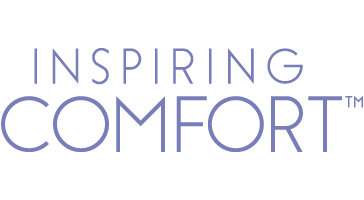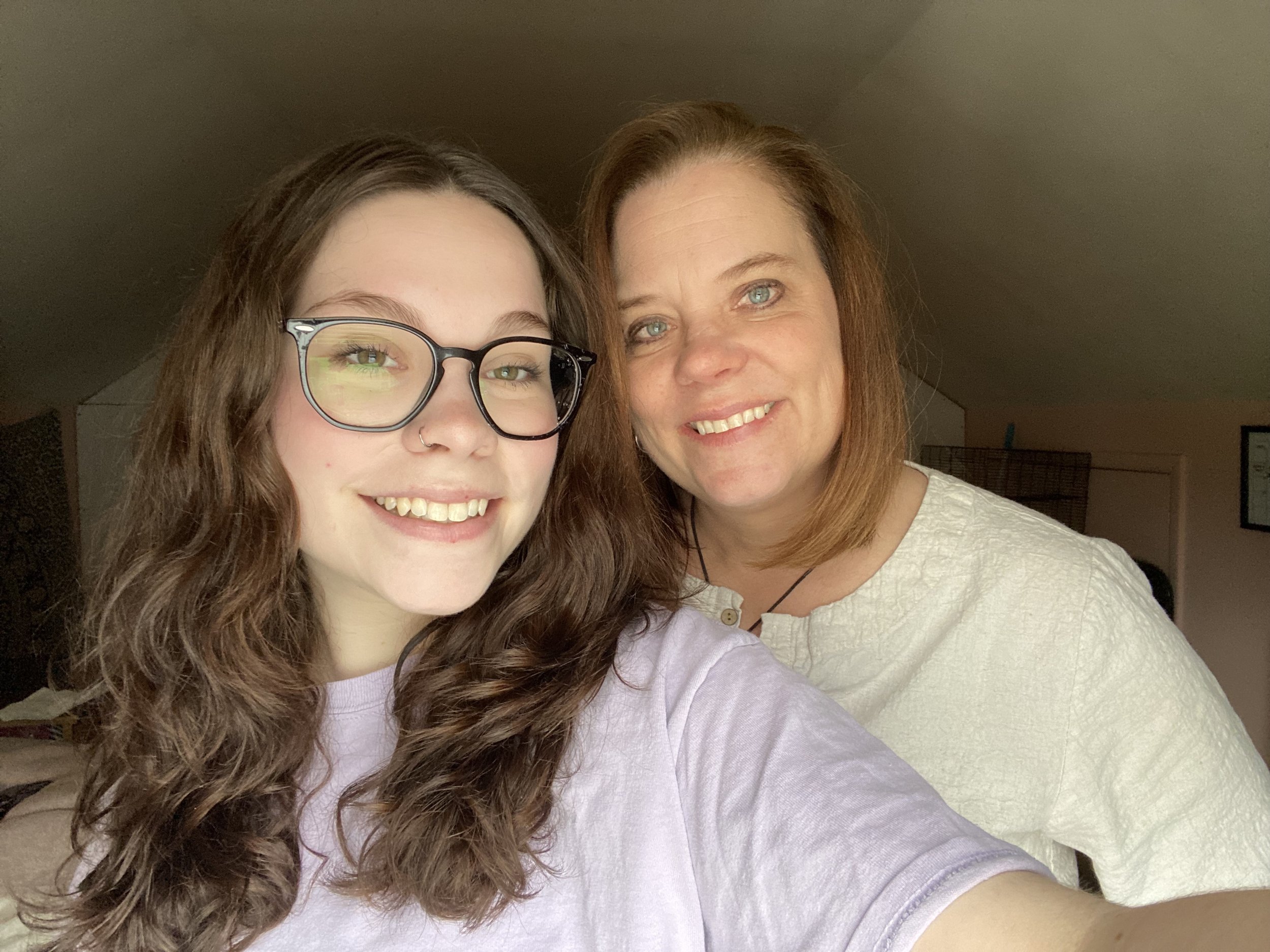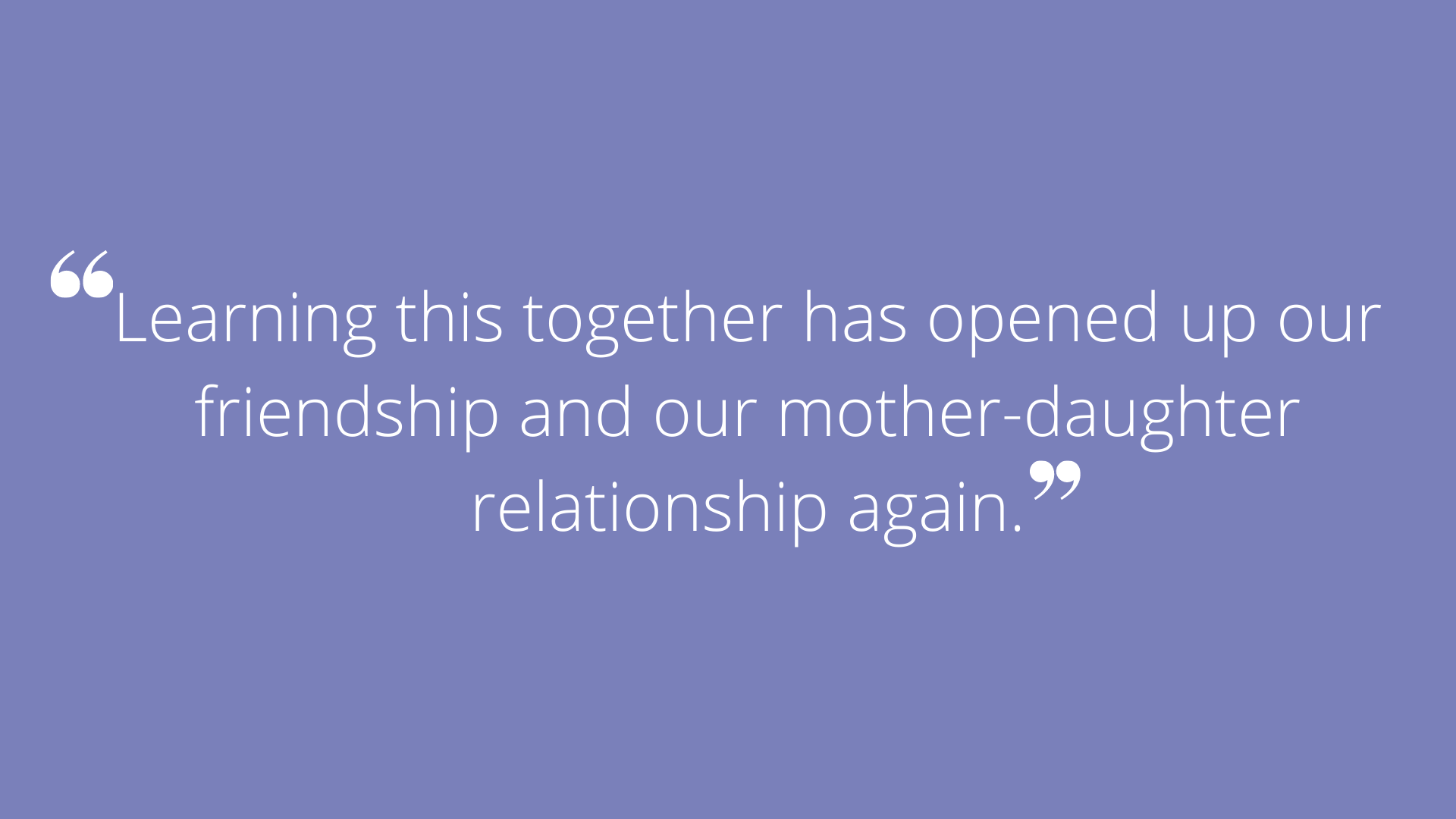From the Field: How Comfort Training Brought A Mother & Daughter Together
It’s a story of a mother and daughter.
In January 2022, Amy Gagne, an elementary school teacher at New Britain School District, began her training to be Certified Trainer with Inspiring Comfort.
At the same time, her daughter, Allison MacInnis, a senior at Central Connecticut State University studying Sociology and Community Engagement, started interning with Inspiring Comfort.
Having faced tremendous struggles over their lives, both Amy and Alli knew what it was like to not feel seen and cared for. They wanted to work with us to make sure that no one felt unseen in their struggles.
Little did they know that training in comfort would transform their relationship with each other.
From left: Allison (Alli) MacInnis and Amy Gagne.
Inspiring Comfort’s Kelly Shannon sat down with them on Zoom for a conversation filled with laughter, vulnerability, and wisdom.
From your perspectives, what are the “breadcrumbs” that led you to realize that care and comfort are crucial to learn?
Alli: My best friend died by suicide my freshman year of high school. And even on her gravestone, it says something along the lines of: “It doesn't matter if I'm donating blood, or volunteering, or doing anything; I just want to help people.” She has always inspired me since I've known her: since kindergarten. When she passed away, knowing that such a kind soul was taken way too soon because of her struggles and everything she's gone through, I knew that I needed to do something with my life to carry on her legacy and to prevent it from happening to other people.
But not only that — it was the way my school and my town handled it. They did not handle it. I was given two days of in school therapy in the library, and then they kind of expected you to get right back into it.
Only a few months after the fact, my Vice Principal pulled my best friend and I aside at the time, and told us we were “too sensitive to suicide.”
We were given a town therapy session for her closest friends, every Tuesday after school. And one of the first times we went there, we had to do an ice breaker and she made us play hangman. Which is just...it’s bizarre. And all of these things have made me realize something needs to change. Because not only was the situation itself traumatizing, but the way the town handled it, the way that the people around us handled it — it was traumatizing in itself.
Amy: I have to go back to Alli’s experience, and look at it through the lens of a mother.
When you see your child who you have such high hopes for as they enter high school, and then this happens on day three, and shatters everything. And you see that the town is not doing what you need them to do. You go into school and you fight for your kids, you say, these kids are still suffering. And they heard me, but not a whole lot was done. They heard me but they didn’t really listen to me. There was a lack of support.
So that was one thing — and then, as I was leaving a relationship, there was also loss there, with people not knowing what to say to me. You’re leaving a marriage, and they just don’t know how to be there. I didn’t want advice; I just wanted to know that someone had my back.
What led you to get involved with Inspiring Comfort?
Alli: I read through the book, and I looked Inspiring Comfort up on the website, and saw all the things you guys are doing. And I mean, this is something I wish was taught to the faculty at my school. I wish this was something that I had received in high school or even middle school through those programs.
I knew that I wanted to get involved, so I reached out to do an internship with you for school. I’ve loved every part of it.
Amy: It was around last year that Kim [Bepko, Certified Trainer with Inspiring Comfort] came back into my life — this angel from above! I hadn’t seen her since high school, so we were going back 30-something years.
The thing about Kim is that during the time that we reconnected, my life was kind of in upheaval, and no one in my current life knew what to say or do. And here comes Kim, who I haven't seen in 30 years, who knew what I needed.
She was the first person who looked me in the eye and said, “Tell me what's going on.” And no one had asked me that — just out of fear, out of uncertainty, or out of “it's not my business,” all those reasons that we talk about in this program. But she saw me, and I felt seen by someone who I truly didn't know anymore. That was a profound moment for me: you see me, and even if I tried to I couldn't hide from you.
I decided I wanted to learn exactly what she had to comfort others. So I started training as a Certified Trainer with Inspiring Comfort.
Talk about some of the barriers you’ve overcome or that you’re still working with when it comes to the “Awkward Zone.”
Alli: My mom and I were in the car back in February, and it was one of those moments where we realized we hadn’t spent a lot of time together. I knew she was struggling, and I hate seeing her in pain.
She opened up to me and then said something along the lines of, “Have you experienced this feeling before?” And I said, “Yes, I have,” and I immediately jumped into telling my experience. And probably 30 seconds into talking. I said, “Let me stop. That's not comfort.” I was like, I've been learning this for a few weeks now, and unloading is not what I'm supposed to be doing. And so I pulled it back.
Amy: I remember just the fact that you were able to say, “Let me stop,” like mid-sentence! Like, oh, man, I see what I'm doing right now and it's not helpful. So we had a good laugh, and we were able to then move on with the conversation with a greater understanding.
Alli: We ended up talking about it, and I think we both came to the agreement that we are really growing in this aspect of our lives.
Amy: An area I’m putting focus on after training is the barrier of “it’s none of my business.” Is it my place? But then I ask myself, if someone were to ask you, with a genuine look in your eye, “How are you?” or “Tell me what's going on recently,” how would that make you feel? It would make me feel seen, just like when Kim did it. And my intention is not to just find out latest news. It's not coming from a place of gossip. It's a place of true caring. So I remind myself that I'm not asking a question because I want to know the gossip, I'm asking because I care about them.
You two have such a collaborative partnership. Can you talk a bit more about how this has brought you together?
Alli: I feel like this has given us an “in” to our friendship — because this is who we are as people. We're so similar. We're both empathetic and sensitive to other people's emotions, and learning how to use that with each other. Learning this together has really opened up our friendship and our mother-daughter relationship again.
For example: a few weeks ago, I noticed she was having a bad day. I finally texted her and asked, “Are you okay? Is there something going on?” And she said, “You know me so well. I needed someone to reach out and ask me if I was okay.”
I have always been aware of other people's emotions. But this has opened me up even more.
Amy: And she does. We've always had a great relationship, but in the past few months, she's asked more often, “How are you today?” Or “How is today?” or just a quick like, “Hey, I'm thinking about you. Just wondering how you are.”
Alli: A lot of the times she'll text me at work around lunchtime, and she just says hi with a little heart. Something so small, but I love it every time.
Going forward, how do you want to apply this?
Amy: I would like to bring this skill to as many people as I can within my school district to start. And then I think what excites me the most is, as I close out my teaching career, my hope is that this is a big part of what I do: whether I go into my little town in Tennessee, or I go to churches or the community center, and just start spreading the word.
Alli: This is definitely something that I want to try to bring to my campus. I have the connections to be able to bring this to our campus and benefit so many people.
For my career path, I want to become a high school guidance counselor in the future, which is just such an obvious connection. Not only would I be able to benefit the kids I'm working with, but even the staff or even hosting a program at the school I end up working at in the future.
What is your favorite thing you’ve learned about showing up?
Alli: The Marble Jar Theory. I've always been the type of person who thinks, I need to do this big thing right away, right now. Now, knowing that I can do a lot of small things has been really helpful for me, because it kind of lets me ease off a little bit on myself and not put so much pressure on myself.
Amy: I love what Alli just said, because what she would do is: someone else's struggle would become her struggle. She would take it on. But the fact that she just said, “I can do something little” — it's more about the the quantity as opposed to that one big action. It's over time. And I don't know that she's ever given herself permission to not dive in up to a point where she would lose herself.
For me, it’s the confidence that I know how to show up. I’m so much more confident in taking that step, knowing what my intention is, and knowing how to approach it.
Alli: I was just thinking the other day, I’m not only just proud to be a part of this myself...but I can also say for a fact that my friend Julianne is looking down at me with the biggest smile. This is what she would have loved too.
*The above conversation has been edited for clarity.
Want to get trained in the same skills as Amy and Alli?
Become a Certified Trainer with us
Visit our Programming page and bring training to your organization or community
Contact us at info@inspiringcomfort.com






